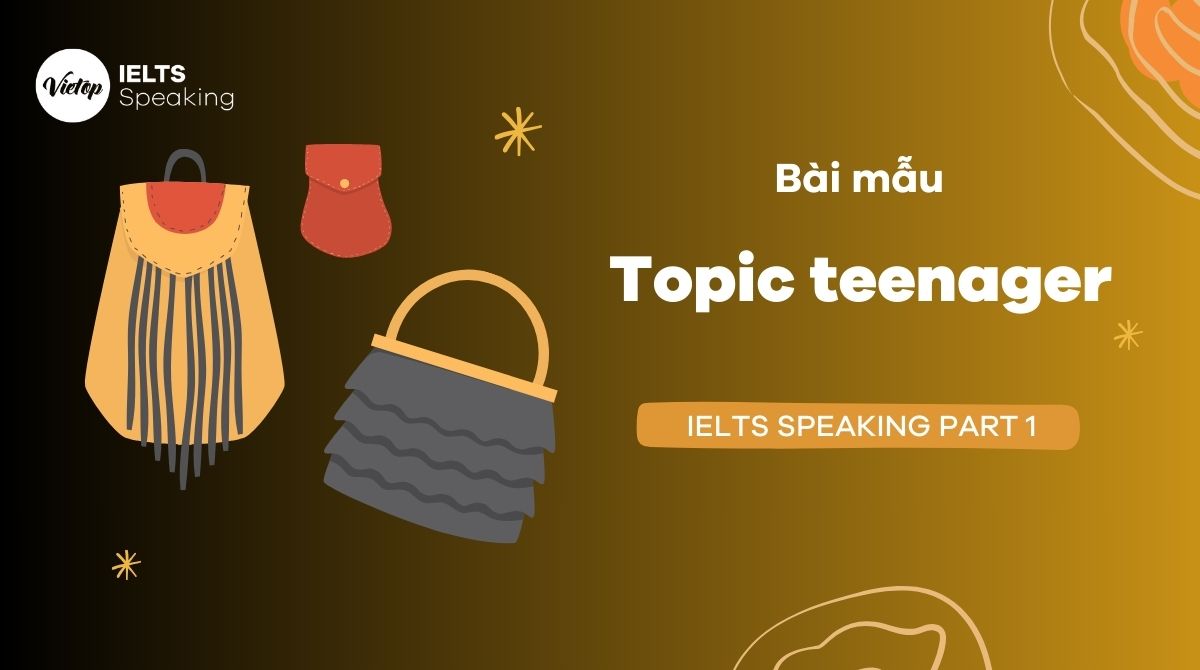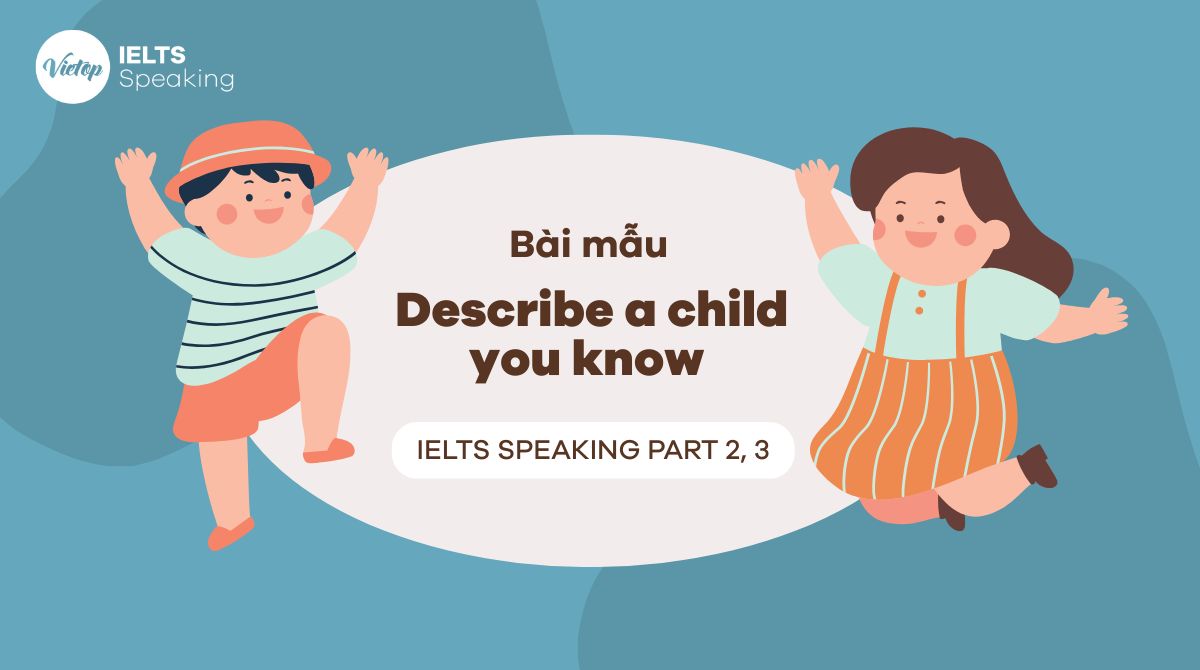Topic Opinions Ideals có thể được xem là chủ đề tương đối xa lạ và khó nhằn đối với nhiều đối tượng người học IELTS tại Việt Nam. Nắm bắt được tâm lý đó, bài viết này sẽ giới thiệu cho các bạn một số từ vựng, thành ngữ liên quan đến chủ đề Opinions Ideals và một số bài trả lời mẫu.
Hãy theo dõi cùng Vietop để theo dõi bài viết để có thêm nhiều từ vựng cũng như ý tưởng trả lời cho các câu hỏi của đề tài này trong phần IELTS Speaking part 1 nhé.
1. Từ vựng topic Opinions Ideals
| Từ vựng | Nghĩa | Ví dụ minh họa |
| Give the green light to | bật đèn xanh (cho phép làm việc gì đó) | The government has been given the green light to the construction of a new train station. |
| Jump down one’s throat | phản ứng giận dữ | Don jumped down my throat when I suggested he clean the kitchen. |
| Give one’s the thumbs-up | ủng hộ, cho phép ai đó | Fran’s dad gave her the thumbs-up to go out with her friends. |
| Burst with excitement | cực kỳ vui mừng | Sally was bursting with excitement as her favorite band came on stage. |
| Speaking one’s mind | nói lên suy nghĩ | This politician has a reputation for speaking his mind. |
| A tough cookie | người quyết tâm, mạnh mẽ về thể chất hoặc tinh thần | Debbie’s a tough cookie. She doesn’t mind when people criticize her work. |
| Hit the big time | trở nên rất thành công | Malik’s band has hit the big time. It performed at the national stadium last night. |
| Rose-colored glasses | góc nhìn lạc quan, tích cực | Optimists really do seem to look at the world through rose-colored glasses. |
| Legally | hợp pháp | He got hold of the money legally, without resort to violence. |
| Be responsible for | chịu trách nhiệm | Our practice is responsible for about five thousand patients in this part of Leeds. |
| Take responsibility | chịu trách nhiệm | She takes her responsibilities as a nurse very seriously. |
| Strengthen | củng cố, tăng cường | The rise in US interest rates caused the dollar to strengthen (= increase in value) against all the Asian currencies. |
| Critical thinking | tư duy phản biện | We need to do some critical thinking to solve this problem. |
| Come up with | nghĩ ra | We’ll think about a present for her and see what we can come up with. |
| Mistaken | nhầm lẫn | If you think you can keep drinking so much without damaging your health, then you’re mistaken. |
| Amend | sửa đổi | Until the constitution is amended, the power to appoint ministers will remain with the president. |
| Independently | một cách độc lập | The two scientists both made the same discovery independently, at roughly the same time. |
| Encounter | bắt gặp | She was, he says, the most violent woman he had encountered in 13 years as an officer. |
2. Câu hỏi liên quan đến topic Opinions/Ideals
Dưới đây sẽ là mộ số câu hỏi liên quan đến chủ đề Opinions/Ideals.

Mời mọi người nghe Audio topic Opinions/Ideals tại đây nhé!
2.1. At what age should children have their own decisions/opinions?
Legally, children only have their own decisions when they are at the age of 18 when they are fully responsible for their decisions. However, I think that in present days, children are often given the green light to speak their mind at younger ages.
2.2. What are the benefits when children have their own ideas/opinions?
Children having their own ideas at a young age may strengthen their critical thinking and they always look at daily difficulties through rose-colored glasses. These children tend to be tough cookies and hit the big time more easily in the future.
Xem thêm: Khóa học IELTS 1 kèm 1 – Chỉ 1 thầy và 1 trò, cam kết đầu ra
2.3. What are the responsibilities of teachers in helping children develop their ideas/opinions?
Firstly, I think teachers should give children the thumbs-up when children speak their mind, instead of jumping down their throat. If the children come up with mistaken ideas, teachers take responsibility to explain and amend childrens’ ideas.
2.4. Do you think children are taught to have the same ideas with their parents?
No. Children’s ideas somehow are greatly affected by their parents, but overall children recently are taught how to think differently and independently in a logical way. Therefore, I think that children can come up with an entirely new and different solution when they encounter daily problems.
2.5. When do children begin to have their own ideas?
Children typically start to develop their own ideas and thoughts at a relatively young age. As they grow and interact with the world around them, their individual ideas begin to form and solidify.
Usually, this process begins during early childhood, around the ages of 3 to 5, when children start to express preferences, make simple decisions, and articulate their thoughts and opinions. As they continue to mature and gain more experiences, their ideas become more complex and refined, shaping their unique perspectives on various aspects of life.
Hy vọng bài mẫu trên về Topic Opinions/Ideals sẽ giúp bạn có thêm hành trang trên con đường chinh phục phần thi IELTS Speaking đầy “cam go”. Nếu có câu hỏi thắc mắc trong lúc luyện thi IELTS bạn hãy để lại bình luận dưới đây nhé. Chúc bạn thành công học tập tốt nhé!










rất tuyệt vời. cám ơn Vietop đã tạo ra những sản phẩm tuyệt vời này. dễ hiểu, dễ nhớ và tính ứng dụng cao.